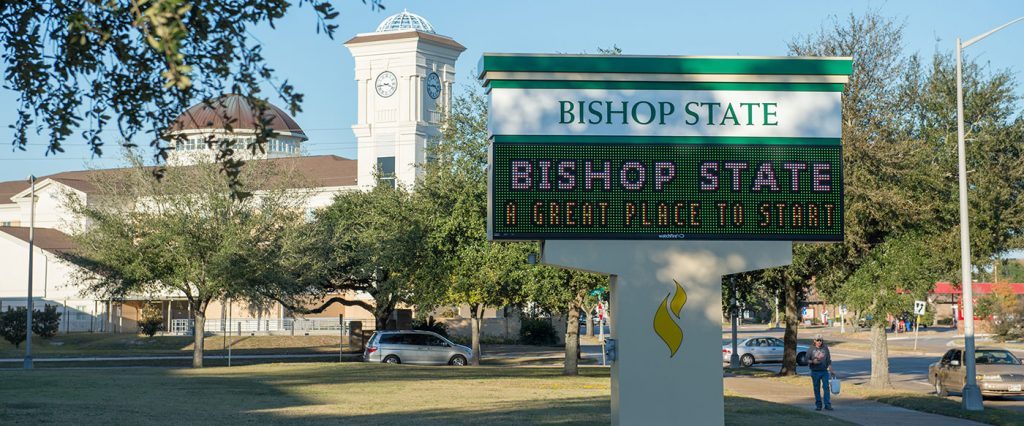
Explore HBCU – Bishop State Community College
Bishop State Community College is a public, historically black community college located in Mobile, Alabama.
Background
Bishop State Community College was founded in the summer of 1927 as the Mobile Branch of Alabama State University in Montgomery, Alabama. Originally, it served as an institution to offer extension courses to African American elementary and secondary teachers in Mobile.
In 1971, the Alabama State Board of Education renamed the college S.D. Bishop State College for its first president, Dr. Sanford D. Bishop. Then, in 1989, to reflect the growth in vocational and career offerings, transfer offerings, and community service activities, the board renamed the institution again to Bishop State Community College. Two technical colleges in Mobile (Carver State Technical College and Southwest State Technical College) were then consolidated with Bishop State Community College.
Presently, Carver State Technical College is the Carver Campus of Bishop State, and Southwest State Technical College is the Southwest Campus of Bishop State. In 1995, the main campus expanded with the addition of the Baker-Gaines Central site. There are also an additional three off-site locations located in Mobile and Washington Counties: the City of Semmes Training Center and the Theodore Oaks Shopping Center which offer art, English, math, psychology and speech communication program courses, and the truck driving site, which houses Bishop State’s commercial driver’s license training program.
The college is accredited by the Southern Association of Colleges and Schools Commission on Colleges.
Programs & Opportunities
A part of the Alabama Community College System—the state-supported network of two-year community, junior, and technical colleges for Alabama residents—Bishop State Community College offers more than 30 associate degree and certificate programs. The programs of study span across health sciences, adult education/GED preparation, career technical education, workforce development, dual enrollment, and those for academic transfer students who want to continue their education at a four-year institution. For students who may want to begin their careers immediately after graduation, Bishop State’s one and two-year career programs can help more quickly prepare students for rewarding jobs.
Learn more about Bishop State Community College’s degree programming here.
Alumni Affairs
Bishop State Community College aims to be a comprehensive learning facility that helps equip students with the knowledge and ability to achieve real-world success. Bishop State instructors are especially in touch with the trends and job requirements of today’s job-market, and as such their students are assured quality education aimed for successful preparation.
Alumni Spotlight: Bishop State alumnus Lawrence L. Battiste IV graduated with an Associate of Science Degree in Criminal Justice from Bishop State (and later earned a Bachelor of Science and Master’s Degree at another institution). Battiste is currently the Chief of Police for the City of Mobile (Alabama) Police Department.
Financial Information
At Bishop State, it is not only important that higher education be made accessible, but what’s more, affordable—the same first two years of academic courses typically cost less than half that of a traditional four-year college or university. Additionally, students are prepared for the workforce for less than half the cost of a for-profit institution.
Tuition and fees are $162 per credit hour—equalling to $1,944 for a typical 12-credit hour semester—for in-state students. For out-of-state residents, the tuition is two times that of the in-state tuition rate.
Conclusion
Through the provision of an open access model to affordable, quality education, Bishop State Community College works to promote student success, workforce training, adult education, community partnerships, and academic transfer.
Learn more about what Bishop State Community College has to offer here.
Sources:
- https://www.findmyhbcu.org/school/bishop-state-community-college/#athletics
- https://www.bishop.edu/about-us/our-history
- https://www.bishop.edu/contact
- https://www.bishop.edu/locations/semmes-site
- https://www.bishop.edu/locations/theodore-oaks
- https://www.bishop.edu/programs/career-technical-education/truck-driving
- https://www.bishop.edu/about-us
- https://www.bishop.edu/programs
- https://bishopstatefoundation.org/bishop-state-community-college-alumni-mobile-al
- https://www.strongnation.org/people/lawrence-l-battiste-iv
- https://www.bishop.edu/financial-affairs/office-of-financial-aid
- https://www.bishop.edu/financial-affairs/tuition-fees
Pictures:
- Bishop State Logo: https://studyalabama.us/institutions/bishop-state-community-college/
- Bishop State Entry: https://www.bishop.edu/locations/main
- Bishop State Finance: https://www.al.com/pr-community-news/2012/04/bp_gives_50000_grant_to_bishop.html
- Bishop State Graduation: https://www.bishop.edu/about-us/vision-and-mission
